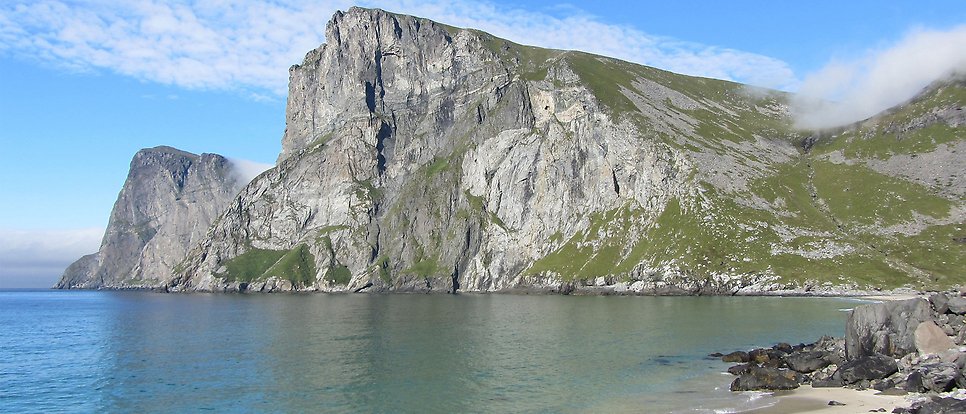Master's Programme in Earth Science – Geology
120 credits

Do you want to be involved in the green transition for sustainable exploration and extraction of mineral resources? Contribute to safe and sustainable locations of buildings, tunnels or nuclear waste? Have an impact on informed natural hazard mitigation associated with volcanoes and landslides? The Master's Programme in Earth Science, specialising in Geology, will enable you to contribute to the sustainable use of Earth's resources for the future.
Autumn 2023 Autumn 2023, Uppsala, 100%, On-campus, English
- Location
- Uppsala
- Pace of study
- 100%
- Teaching form
- On-campus
- Instructional time
- Daytime
- Start date
- 28 August 2023
- Language of instruction
- English
- Entry requirements
-
Academic requirements
A Bachelor's degree, equivalent to a Swedish Kandidatexamen, from an internationally recognised university.
Also required is:
- 90 credits in earth science and 15 credits in chemistry; or
- 90 credits in physics and 30 credits in earth science; or
- 90 credits in engineering and 30 credits in earth science; or
- 90 credits in geology.
Language requirements
Proficiency in English equivalent to the Swedish upper secondary course English 6. This requirement can be met either by achieving the required score on an internationally recognised test, or by previous upper secondary or university studies in some countries. Detailed instructions on how to provide evidence of your English proficiency are available at universityadmissions.se.
- Selection
-
Students are selected based on an overall appraisal of previous university studies, a statement of purpose and other relevant experience.
- Fees
-
If you are not a citizen of a European Union (EU) or European Economic Area (EEA) country, or Switzerland, you are required to pay application and tuition fees.
- Application fee: SEK 900
- First tuition fee instalment: SEK 72,500
- Total tuition fee: SEK 290,000
- Application deadline
- 16 January 2023
- Application code
- UU-M1850
- Additional information
-
In addition to the general supporting documents, you also need to submit a programme-specific statement of purpose (1 page).
The statement of purpose should provide a clear motivation for the chosen programme and specialisation; include information on your Bachelor's thesis (if any) and its relevance to the programme; and describe other relevant experience, e.g. fieldwork, internships, work experience, previous studies abroad, involvement in a student union or academic societies, communication skills.
Check the application guide for information on how to apply and what other supporting documents you need to submit.
Autumn 2024 Autumn 2024, Uppsala, 100%, On-campus, English
- Location
- Uppsala
- Pace of study
- 100%
- Teaching form
- On-campus
- Instructional time
- Daytime
- Start date
- 2 September 2024
- Language of instruction
- English
- Entry requirements
-
Academic requirements
A Bachelor's degree, equivalent to a Swedish Kandidatexamen, from an internationally recognised university.
Also required is:
- 90 credits in earth science and 15 credits in chemistry; or
- 90 credits in physics and 30 credits in earth science; or
- 90 credits in engineering and 30 credits in earth science; or
- 90 credits in geology.
Language requirements
Proficiency in English equivalent to the Swedish upper secondary course English 6. This requirement can be met either by achieving the required score on an internationally recognised test, or by previous upper secondary or university studies in some countries. Detailed instructions on how to provide evidence of your English proficiency are available at universityadmissions.se.
- Selection
-
Students are selected based on an overall appraisal of previous university studies, a statement of purpose and other relevant experience.
- Fees
-
If you are not a citizen of a European Union (EU) or European Economic Area (EEA) country, or Switzerland, you are required to pay application and tuition fees.
- Application fee: SEK 900
- First tuition fee instalment: SEK 72,500
- Total tuition fee: SEK 290,000
- Application deadline
- 15 January 2024
- Application code
- UU-M1850
- Additional information
-
In addition to the general supporting documents, you also need to submit a programme-specific statement of purpose (1 page).
The statement of purpose should provide a clear motivation for the chosen programme and specialisation; include information on your Bachelor's thesis (if any) and its relevance to the programme; and describe other relevant experience, e.g. fieldwork, internships, work experience, previous studies abroad, involvement in a student union or academic societies, communication skills.
Check the application guide for information on how to apply and what other supporting documents you need to submit.
About the programme
This specialisation focuses on mineral and rock formation and deformation in a wide range of geological environments. It provides you with expertise to contribute to the green transition and sustainable societies.
There is significant emphasis on geochemistry and geochronology as tools to understand geological processes. Projects within the courses also provide experience with 3D modelling, analogue tectonic modelling, as well as geochemical, thermobarometric and thermodynamic modelling.
During the programme, you can expect to:
- learn diverse applications of minerals and tectonics,
- learn how to find a balance between using and preserving Earth's resources,
- learn 3D modelling and analogue tectonic modelling as well as geochemical, thermobarometric and thermodynamic modelling.
The Department of Earth Sciences at Uppsala University is one of the most comprehensive academic departments of its kind in Europe. Research in Earth Science focuses on subjects that range from the Earth's core to the atmosphere. It focuses on scales from sub-microscopic minerals and fossils to the formation of mountains and oceans, and in time from the formation of the Earth to the processes currently reshaping the planet.
Research within geology focuses on Earth system processes and their interactions from the core to the surface and from crystal to plate-boundary scales. We target natural resources including critical metals, natural hazards, magma plumbing systems, mountain building, and global geochemical and geodynamic cycles.
Degree
The programme leads to the degree of Master of Science (120 credits) with Earth Science as the main field of study. After one year of study, it is possible to obtain a degree of Master of Science (60 credits).
Content
The first semester starts with a choice between the course Exploration and Environmental Geophysics or Dynamics of Earth Systems - Global Change and Applied Geoinformatics. Method courses are also offered from the first semester with Analytical Methods in Earth Science and Applied geoinformatics. The Presentation and Publication course helps you develop your communication skills.
The courses in geology reflect the nature of Sweden’s dominantly hard rock geology. Courses in mineralogy and gemmology, geochemistry of volcanic and magmatic systems, and metamorphic and metasomatic processes prepare you for the course Fennoscandian and Beyond: Orogenies Through Time and the Geodynamic Field Project.
In the third semester, we offer courses on tectonics and geodynamics, applied 3D mapping and modelling, exploration geochemistry and economic geology. Such courses provide valuable preparation for your research thesis as well as a career in industry or research.
The fourth and final semester of the specialisation is a degree project in the form of an independent project.
Courses within the programme
Learning experience
The teachers in the Master's Programme in Earth Science are experts in their respective fields, giving you up-to-date contact with front-line research in an open and creative educational atmosphere. The teaching consists of a balanced mix of theoretical and practical work providing experience in both research and industry-oriented applications. Excursions, fieldwork and study visits are included in some courses.
Instruction in the Master's programme builds on your experience and knowledge from your previous education. You are expected to actively participate and contribute to the learning environment and take responsibility for your own and others' learning. The teachers are responsible for creating opportunities for active learning at the individual and group level. Purposeful and respectful dialogue between teachers and students contributes to the constant improvement and development of courses.
Examination generally includes written exams, complemented by seminar presentations/discussions, project work, laboratory work and field reports.
Career
The Master's Programme in Earth Science, specialising in Geology, provides you with knowledge and skills for a career as a qualified professional in the industry, the public sector and consultancy firms. You may also choose to pursue research by continuing with doctoral studies.
Our alumni work in a wide range of industrial and research sectors. Employment opportunities are associated with the green transition as exploration or mine geologists, in the geotechnical industry, in geochemistry, in geothermal energy, and with natural hazards. The need for professional geologists has increased considerably during the last few years both on a local and global scale, due to the increasing demands for natural resources and infrastructure.
Our graduates work at, for example, Boliden AB, Rejlers AB, and Sweco AB. Job titles include exploration geologists, geologists, engineering geologists, etc.
Career support
During your time as a student, UU Careers offers support and guidance. You have the opportunity to take part in a variety of activities and events that will prepare you for your future career.
Is this programme right for you?
Read interviews about the programme.

What people say about the programme
Watch our programme video.

Register your interest
Keep updated about the application process.

Programme syllabus
- Programme syllabus valid from Autumn 2024
- Programme syllabus valid from Autumn 2023
- Programme syllabus valid from Autumn 2022
- Programme syllabus valid from Autumn 2021
- Programme syllabus valid from Autumn 2020
- Programme syllabus valid from Autumn 2019
- Programme syllabus valid from Autumn 2018
- Programme syllabus valid from Autumn 2017
- Programme syllabus valid from Autumn 2016, version 2
- Programme syllabus valid from Autumn 2016, version 1
- Programme syllabus valid from Autumn 2015
- Programme syllabus valid from Autumn 2014
- Programme syllabus valid from Autumn 2013
- Programme syllabus valid from Autumn 2012
Outline
- Outline valid from Autumn 2024
- Outline valid from Autumn 2023
- Outline valid from Autumn 2022
- Outline valid from Autumn 2021
- Outline valid from Autumn 2020
- Outline valid from Autumn 2019
- Outline valid from Autumn 2018, version 2
- Outline valid from Autumn 2018, version 1
- Outline valid from Autumn 2017, version 2
- Outline valid from Autumn 2017, version 1
- Outline valid from Autumn 2016, version 2
- Outline valid from Autumn 2016, version 1
- Outline valid from Autumn 2015
- Outline valid from Autumn 2014
- Outline valid from Autumn 2013
- Outline valid from Autumn 2012
Contact
- For programme-specific questions, please contact Programme Director Abigail Barker:
- abigail.barker@geo.uu.se
- +46 18 471 25 52
- For programme-specific information, please contact our study counsellor:
- studievagledare@geo.uu.se
- For admissions-related or general information, please contact our applicant support team:
- masterprogrammes@uu.se
Students
As a student you will find information about your studies in the student gateway.
